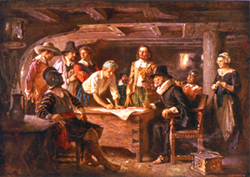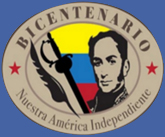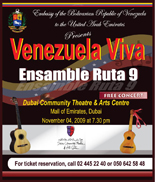
Bolivarian Republic of Venezuela
Embassy in the UAE
English | Spanish
Brief History In the early colonial period, what is today Venezuela were different provinces that depended alternatively from the Crown in Madrid, the Viceroyalty of New Granada or the Royal Audience of Santo Domingo and had certain autonomy. In 1777, the province of Venezuela became a Captaincy General, and assumed the central government of the provinces of Margarita, Trinidad & Guayana, Mérida-La Grita and Cumaná or New Andalusia. At the end of the 18th century, it became the most important farming colony, producing mainly coffee and cocoa. A local landowning class of European extraction developed, using African slave labor on their plantations. The mestizo, who constitute the overwhelming majority of the population today, are the descendants from the mix between the Africans, the Indians and the Europeans. Two of the greatest leaders of the Latin American Independence were born in Venezuela: Francisco de Miranda and Simón Bolívar. On April 19th 1810, the war of Independence broke out after the constitution of a Cabildo or Assembly. Miranda became the commander of the army, envisaging a vast American Confederacy, but his dreams did not come to fruition as the Spaniards captured him in 1811, dying in prison in La Carraca (Cádiz, Spain) in 1816. Bolívar took up Miranda’s project for American liberation and was backed, in principle, by his peers, the landowners. In a swift campaign (1812-13) he took over the country, and was able to install a government in Caracas. In 1814, Bolivar was defeated by the Spanish loyalist General José Tomás Boves, and in 1815 had to flee to Haiti, where President, Alexandre Sabés Petión, helped him return to Venezuela in 1816. Accompanied by other important military leaders like Antonio José de Sucre, Santiago Mariño, José Antonio Páez, Rafael Urdaneta and Juan Bautista Arismendi, he carried out successful military campaigns in the northern half of the continent. He subsequently founded Bolivia in what had hitherto been known as «Upper Peru». In 1819, the Angostura Congress created the new republic of «Gran Colombia», uniting Colombia (Panama was still part of it), Ecuador, and Venezuela. The resounding victory of the Republicans, commanded by The Liberator Simon Bolivar, at the Battle of Carabobo, on June 24th 1821, turns the fate of the War of Independence, which ended with the Naval Battle of the Lake of Maracaibo, on July 24th 1823. The internal struggle for power between Bolivar and Páez, leads to the exile of the first to Colombia and the dissolution of the Gran Colombia, in 1830, which worsened Bolivar’s frail health leading to his death on December 17th of the same year, in San Pedro Alejandrino, near Santa Marta, Colombia. In that same year of 1830, a political period called “El Caudillismo” started in Venezuela with the ruling of two major parties, the Conservatives and the Liberals. This situation ended with the Federal War, fought between 1859 and 1863, which devastated the country, leaving it in very precarious economic and social conditions. Liberals and Conservatives fought for their own privileges. In 1863, the Liberals won the war, consolidating democratic principles and rights in the Constitution of 1864. A sequence of governments followed during the period between 1863 and 1908, giving the country an unstable political climate. In 1908, Juan Vicente Gomez seized the Presidency through a Coup d’état, marking the beginning of Venezuela’s longest dictatorship, until his death in 1935. From 1935 to 1948, there was a political transition to democracy, but in November 1948, Lieutenant Colonel Marcos Perez Jimenez led a military regime that held the government until January 23rd 1958, when a popular movement toppled him. Since 1958, Venezuela has had democratic governments elected by the people. Democratic principles and public rights have been consolidated through civic participation, opening the country to social advancements and economic progress. |








